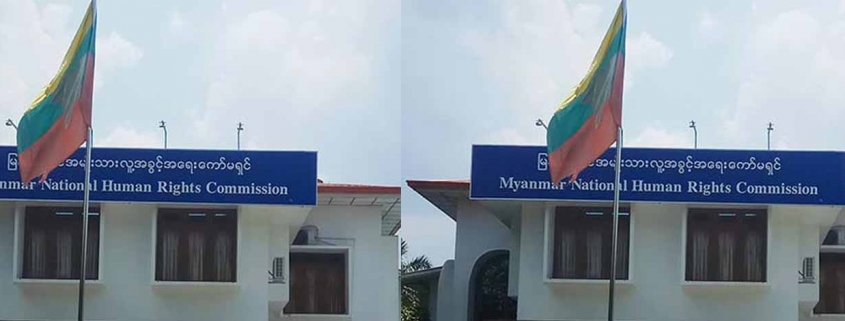Myanmar National Human Rights Commission Statement
1. The inspection team from the Myanmar National Human Rights Commission visited and inspected the followinginternally displaced persons (IDP) camps in Kachin State:
(a) Kachin Baptist Church (KBC), Roman Catholic Church (RC), Anglican Church (AG) located in lang-gwa village of Moegaung township, IDP camps located at the entry of Moegaung town, and Lawah and Line-naung RC IDPcamps located in Karmine township on 21 June 2018;
(b) Jaw-ma-sup, tan-phe-rehand trinity IDP camps located in Myitkyinatownship, and Wine-maw zone IDP camp located in KBC of Wine-maw township on 22 June 2018.
2. It is learnt that displaced villagersfledinto the forest because of fear from being hit by bomb explosions that fell near their villages and because of fear of clashes of the armed organizations of the two sides near their villages.
3. It is learnt that, along the route of escape, they had faced difficulties from shortage of food and potable water, shortage of medicines for sickness and diarrhea andnot havingenoughshelters. Moreover, elderly persons and children were unable to walk due to malnutrition and had to be carried and some pregnant women had to give birth in the forest and some newly born babies and elderlypersons died due to severe weather conditions.
4. In addition, villagers stated that at the time they were hiding in the forest, there was shortage of food and villagers who went back to their villages to fetch for food found out that their houses were destroyed, furniture and household items and their pets lost.
5. It is learnt that in most of the IDPcamps inspected by the Commission’s team, villagers have been facing the following difficulties:
(a) as the donated temporary tents are not adequate and as there is no partition between one family and another in the tents, there is possibility of unnecessary social problems and occurrence of communicable diseases;
(b) there is lack of potable water and unclean water for bathing;
(c) asthe kitchen is close to sleeping area in the camps where cooking for families is permitted, there is fire hazard;
(d) number of toilets are not enough for people;
(e) at the time of heavy raining during monsoon season, the floor of living quarter is submerged under water;
(f) as donors and well wishers donate mainly rice and peas, there is requirement of fund for other food items;
(g) although responsible persons have arranged for children to attend school, villagers in the camps for displaced persons lack fund and hence unable to provide other requirements of children;
(h) although boarding and tuition fees could be paid from the proceeds of sale from the crops of hill-side cultivation and cattle for some eighth, ninthand tenth standardsstudents who were sent to boarding schoolsin the past, being in the IDP camps in the present situation deprived them of any income and is facing difficulty for children’s education;
(i) as the season for paddy cultivation is already over for the coming year,in addition to damage of rice and paddy reserved for consumptionduring monsoon season in villages, there is difficulty for their livelihood for two years.
6. As the Commission’s inspection team was unable to visit Danai town due to time constraint, some responsible persons from IDPcamps ofDanai town came to Myitkyina and met with the members of the Commission and told their difficulties that there are four camps, i.e., KBC, RC, AG and COC, having 333 households with 1317 members; that as such camps have not been recognized as IDP camps, they have not received any aid provided by the State as well as donations and humanitarian assistance; and that in addition, like IDPcamps in Myitkyina, they have been facing congestion in the camps, shortage of food and water, education and health problems for their children.
7. Based on the foregoing findings, it is assumed that, in order to overcome the difficulties currently faced by the IDPs, the Union Government should not only provide necessary aid and assistance effectively but also make appropriate arrangements for humanitarian assistance donated by local and foreign donors accessible to them.
8. Although the skirmishes have stopped at present, it is seen that as the displaced persons dare not return to their villages, the respective Hluttaw Representatives, responsible persons from the State Government and responsible military officials undertaking the security of the region, together with village administrators and village elders, should visit such villages and arrange for the security, building of trust and confidence, hill-side cultivationand to live and move freely within the region.
9. As the citizens living in the villages, includingelderly people, children, pregnant women and the disabled, are faced with above-mentioned manifoldproblems, the Myanmar National Human Rights Commission would like to urge for the early realization of the Union Peace Process which the State is currently implementing.


